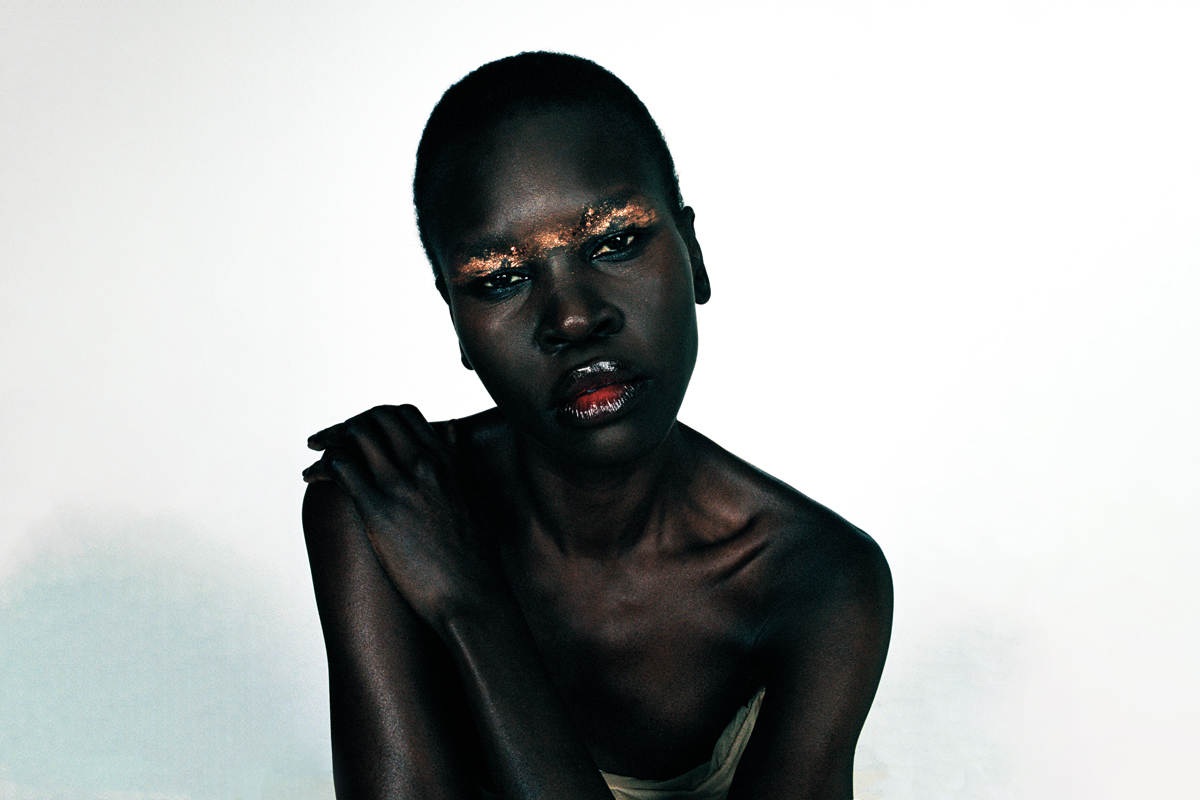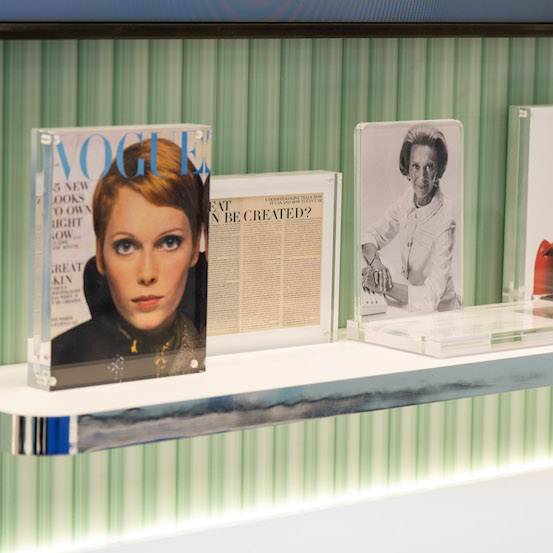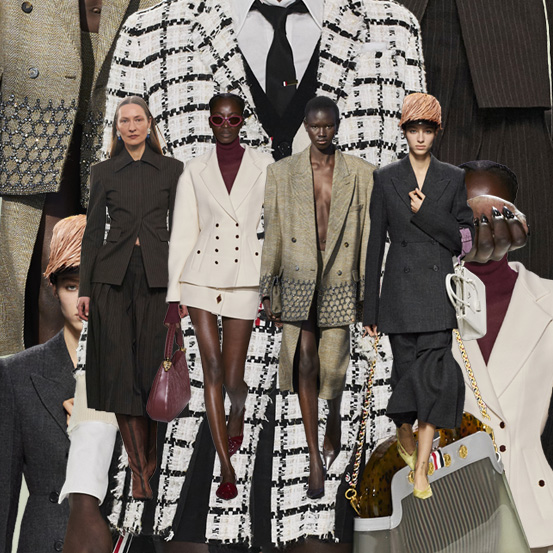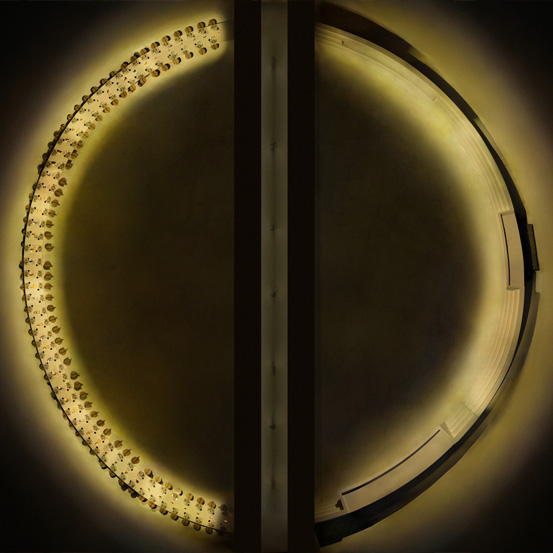It has nothing to do with what happens to us, but with what we do with it. A refugee turned supermodel, turned activist, and UN ambassador, Alek Wek has squeezed all of life’s lemons and made what may be the antidote the world is needing right now.
It has nothing to do with what happens to us, but with what we do with it. A refugee turned supermodel, turned activist, and UN ambassador, Alek Wek has squeezed all of life’s lemons and made what may be the antidote the world is needing right now.

©Photography by Hugo Comte. Styling by Cláudia Barros.
©Photography by Hugo Comte. Styling by Cláudia Barros.
When I need to explain my mother why I do what I do, I tell her of people like Alek. Stories of people like Alek. How Fashion can transform the life of a person and how that person can change the lives of many others. It is an endless love exchange. I am not here for the shoes, the bags, nor to say the trends of the next season – of course I love the clothes, that is not the question. I am here to be a vehicle, a message carrier between people who have already done a thousand and one things more important that I have. Thanks to my job, I have the privilege to hear them, interpret, edit their stories, and conveying them in the most faithful possible way.
Because sometimes, not always, nor everyone, the achievements of someone big, huge, like Alek Wek, can resonate in our heads, change our ideas, inspire us to be better, or at least make us believe that it is possible, and that the world is a little bit nicer. Whatever we call it, if this amazing woman, with all she stands for, is standing in front of me, then Fashion has fulfilled one of its many purposes and has spread a little bit of love on one of its many chapels. But yes, mother, I also love shoes.
Alek Wek’s message is loud and clear. It has been heard for dozens of years, when she was still a very little girl, who faced very big issues. It is the message of a fighter, who escaped a childhood with everything she did not have, but with everything she needed to have the power of spreading that message around the world. Her parents did not give her toys; they taught her that we only get something if we worked hard for it. They made her realize that she was one among many, but also that she was special.
Alek grew up feeling special. She did not tell me so with these exact words, but we can feel it in the air, sense it in the nuances of her voice, and see it clearly in her story of her life. “Kindness is a language that deft people can hear, and blind people can see”, said mark Twain, and everything Alek needs to do is speak. Only someone this special would have always spoken a language that only now we are including in our dialects and make questions that took decades to get our attention, spreading words of love, inclusion and empathy without needing a Dior T-shirt do so.
"Education is everything. Not just knowing how to read and to learn but being able to communicate with other people; knowing what is right and what is not"
Alek lived many lives in one. Alek is many Aleks, but she is always there for others. Today’s Alek in seating on a couch at the lobby of a hotel in Lisbon, for an interview scheduled a few hours ago. She is tired, with cramps because she just got her period, after two days of shooting, but she has a gentle smile on her face and the generosity to start a spontaneous conversation with someone she met a few minutes ago. The first thing she does when I arrive is praising the work of the team she was with the day before: how Cláudia is so young and interested, how she knows so much about art and how that moved her; that Hugo told her that his mother invested all her money in his architecture degree, “and he told me he makes deposits in her account and I found it so sweet, at such a young age... I do the same to my mother and sister. You know, it takes a village to raise a child, and it takes a team to make something magical.”
I suppose that being interviewed is not an easy exchange. Alek does not much about me, but I have read so much about her, which may mean a lot, or not, one never knows. Her South Sudanese Cinderella story is widely known. She wrote a book about it: how she left her country, her home and family and moved to London when the civil war exploded; how she fell in the Fashion world by parachute; how she moved the Fashion industry; how she upturned her prejudice and still manages to have the energy and the will to do so, not just on runways and before the lens, but also through her active role in the refugee cause.
"We can all be refugees. We may find our souls there. These are families. It is not because I am Alek Wek, the supermodel now... I was exactly like them"
One of the things I quickly understood was that Alek Wek is not the kind of person who you give you a nice and clean answer, ready to be introduced into a text frame. If you want to talk to Alek, if you really want to know her, you must be willing to stop and listen to a story with a beginning seemingly unrelated to the end. It is like a tennis game in which you have an initial disadvantage, because you are talking to a pro, and you feel like a clueless ball catcher, between the question you have launched, the answer that does not seem enough, and the huge number of balls that are being launched in between. Then you realize you are not only dealing with a top player, but also with a true connoisseur of the game. She never forgets the initial launch – the thing is that in a career with two decades, one often must go to the past to explain what was (then) the future and is now the present that seemed obvious to us in the beginning.
She has idiomatic expressions of her own. When she releases a “side note” in the middle of a long and logic thought, you must realize that you are about the catch a ball that is not even a tennis ball – it may even be inline skates; it was an idea that came to her mind, or something she thought it was funny and wants to share with you in that exact time, as if she is afraid it vanishes into the air, or as if she wanted you to have total access to the inside of her skull (her head can be anywhere at the same time, but her attention is yours, and she is very generous to you). For instance, there was this moment, in the middle of a super serious conversation in which I expressed my shock for realizing her first Vogue cover was only in 2018, for the Ukrainian edition.
She tells me that had never been a goal to her because “I am not an angry person and I will simply continue to work”, and then interrupts herself to say how grateful she is for her genes. It was something like this: “I was going to present the British Fashion Awards, and then I wanted to go eat chicken wings, because I love chicken wings and there is this place in London that serves the best. So, I get there and ask for the hot sauce and everything, and the waiter says, ‘you’re popping’ and I remembered I was wearing a lot of make-up, and I laughed a lot; then I sit down and thank my parents for my genes. It is not just about me. They gave me the genes that kept me going on. It is not easy. I have never done a facial in my life. Sleep, eat and be happy. Because this will affect your health in so many ways. My mothers says, ‘take life easy’, so I like to keep things balanced and practice a lot of yoga.”

There is also the goofy-Alek that goes over the top when she gets carried away by an idea. She waves her arms, makes sounds and turns into a theatrical animation, laughing loudly, coming closer. She does it when she tells me about her fox terrier, Little Bit. She knows when Alek gets home upset, and she goes straight to her pillow. When Alek is calmer, she goes to her and Little Bit shows her appreciation and her gratitude. Alek finishes the sentence saying:“Some human beings are just energy suckers: they never give you anything in return.” The same applies in reverse: for instance, when I told her I had read that her name meant “spotted cow” and that was a sign of blessing, she showed me, by lowering her voice, that she was tired of being asked that question, without needing to tell me so. However, she did tell me that, for the South Sudanese people, her people, the Dinka, cows are sacred animals, and thus considered a good fortune sign, that’s all. “In our tribe everything is a blessing, life is a blessing.” I called this side of her the bored-Alek.
And then there is the annoyed-Aled, the offended one, who frowns when she talks about representation and tells me she has always heard she was the “new Grace Jones,” and now they are telling younger girls “they are a new Alek Wek,” and that everyone is different – and difference should be more respected than the color of one’s skin. And then there is the guru-Alek, who says things that could fill an entire quotations’ book I would not mind keeping on my nightstand for those days when the compass is not working, and we need someone’s honesty to give us our own honesty back.
“I ain’t got shame in my game.” “It is very important to follow your heart”, “We will always be our mom’s little children”, or “Growing up hurts” are some of the sentences that make guru-Alek my favorite, because, truth be said, the world is full of successful models, but has not got many people who says wise things. In my humble opinion, I think what the world need is people who love it, whatever their field is. These are the people who give back, who put band-aids on other’s wounds, who tell stories, who practice peace, who feel good about themselves and about where they came from, who make the world a more habitable and human place to live. And these qualities do not have much to do with success, at least not with our modern concept of the term.
"I always knew what I loved. If it was up to my mother, I would have eight children by now. I would have already given her a bunch of cows from some dinka guy"
Of course, this makes Alek some sort of human lottery, not just because she gathers all these wholehearted qualities, like the American call it, but also because she is a hell of a professional, whose course in the Fashion world was so intense that not only made History, as changed it forever. The irony of this story – or maybe not, for those who pay attention to the subtilities of faith – is that when Alek landed in the Fashion world, she knew absolutely nothing about it (nor it about her, but that is another story).
What she did have was a irreproachable work ethics, the knowledge given to her by her father (who died while they were running away from the war, but whose presence is intact until today), a mother who always showed her how beautiful we all are and who would call during Fashion jobs to talk to the agents (“Who is this? This is mother”, it is how she describes it), and a certainty that she does not really know where it comes from, she was born with it, that told her that everything that was happening was not about her.
"I came to Fashion because I love arts, I love to evolve as a human being and to have worked with people like Irving Penn and Herb Ritts, I have no words... those were magical moments, in which we spoke about History, about so many things"
“Or even Fashion. This is about education,” she says. “Education is everything. Not just knowing how to read and to learn but being able to communicate with other people; knowing what is right and what is not. Blessed is my father’s soul, who has always told me: ‘Alek, your instincts do not lie. And you cannot read people’s mind, and they cannot read yours, so it is very important to be engaging. And if you are not educated, you cannot respect yourself nor others.’ I have that background. Coming to the Fashion world is a new thing: for me, coming from South Sudan, or any other girl. There are sooooo many people. And there are not exactly laws or regulations, like when you work at an office with conduct laws. You must deal with young people and with adults, and that can become very confusing, but at the end of the day, it is a business and that is how I have always seen it, since the first day.
At the time, some people did not believe me commercially. They said: ‘she is a bit bizarre, a bit strange’. That gave me even more strength to do it, because I felt the responsibility of the faces that need to be represented, the stories that must be told. The refugee crisis… we can all be refugees. We may find our souls there. These are families. It is not because I am Alek Wek, the supermodel now... I was exactly like them. So, it is important to use a platform to illuminate these important issues, like the refugee crisis, like neglected diseases, malaria, HIV… Just because some diseases do not occur here, that does not mean they are not a problem. These diseases kill many, many people. And it is not a problem of a specific place. It is a problem of mankind. Sometimes we are talking about shoes or clothes as if they were people, as if they were an emergency.
Life and health are emergencies. I focus in these issues and they make me humble. Because, at the end of the day, we all have a bed to sleep, doctors to see; we can protect ourselves because we are educated. We can make a difference as human beings if we take responsibility and look at the big picture – even writing about it can make a difference. It is all a matter of choice. That is one of the things that makes me work and still enjoy working in Fashion. And I love the outfits, of course. [Laughter.] Goofy-Alek is back, after a very, very annoyed-Alek, and a big glimpse of guru-Alek.

“I always knew what I loved. If it was up to my mother, I would have eight children by now. I would have already given her a bunch of cows from some dinka guy; she is very upset. The other day, I was telling her: ‘Mum, we must move on. Give up. You have my other sisters. You have already made the oils, the weddings and the cows. Leave me alone. I am going to be the weird arts girl.’” She used to make small cows (here they are again) sculptures in mud, refusing to play the role of pretty girl her mother wanted her to play.
“Sometimes she looks at my clothes and says, ‘But why did you wear this? This is not a pretty dress.’ Other times, she says: ‘Oh, my daughter, you look so beautiful. You should continue to wear that’, and I say, ‘I wear what I want to wear, mother. It is called Fashion’; and she answers, ‘Well, I do not like that Fashion thing, then.’” It is obvious that Alek knows that her job is more than an opportunity to wear pretty dresses. What does Fashion mean to you? “Many people think I became famous just because of the way I look. It is not so. My agent had to fight so I could get that Elle cover in 1997. All my friends were doing everything. My agent had to say ‘It is not fair. She is good enough. She does all the shootings, and she is selling, she is wearing the clothes...’
"The business needs more diversity. Equal representation. And creativity. If you gather all these things you will have something very powerful. It is a message for the next generation. That is how change happens, and change is very important"
That is another thing: I wear the clothes I sell. And I wear them in a very modern way. And I used to practice yoga so I could bend and stretch. I think it is very important for girls to know that being pretty is not enough. You must be professional. You must work with people as a team. Team work makes the dream work. It is not just funny – it is real. And this is a business, it is money. This is people’s life, and people need to eat. I came from nothing and I got there, and I thought, ‘This shit must work.’ And when you believe and are passionate, it does work. But you need a team that also believes in it, and my agent had to say many times: ‘No, this is not right. This is not about black and white anymore. It is about respect.’ And then they started feeling stupid. Because they would say things like, ‘Oh, she is so sophisticated. We love her.’ OK, so where is the cover?” And the cover did come along.
Did you feel a difference? “Oh yeah... oh yeah. You must remember that there were no social media, so people read, people saw things. Now you need to be more strategic to be seen and to sell. It was very important to see. Not everyone could buy the pieces, but they could see them. That is why it is so important to represent a broader specter, including in advertising. Brands want that now. And I wear the dresses, look in the mirror, and sometimes tears come to my eyes, because I remember being the Chanel bride and Anna Wintour coming to the backstage. I was in the industry for just five years, and I was changing clothes. She took her sunglasses off and told me: ‘That was fabulous’. And everyone asked me: ‘Do you know who she is?’ She knew something magical has happening at that moment.

And it was not just because she was different – she knew it. It was about selling these things because people’s lives are involved. “To me, that is enough. All the other fluff is nonsense. I came to Fashion because I love arts, I love to evolve as a human being and to have worked with people like Irving Penn and Herb Ritts, I have no words... those were magical moments, in which we spoke about History, about so many things. The business needs more diversity. Equal representation. And creativity. If you gather all these things you will have something very powerful. It is a message for the next generation. That is how change happens, and change is very important.
If you get fixated on something at a young age, you get stuck; stuck on ignorance and that is the most dangerous thing of our society. This is the only way and that is why this is beauty. Beauty is everywhere, it is all of us. We are different as individuals even if we have the same parents, and it is important to show that. I learned that with age, as I became mature. It is not about me. It is bigger than me. If we can use this Fashion platform to correct things, we will not be stuck as adults,” she makes a pause to introduce me a new Alek, the naughty-Alek. “Well, I hope I answered your question about what makes me work in Fashion,” she says, laughing.
"I learned that with age, as I became mature. It is not about me. It is bigger than me. If we can use this Fashion platform to correct things, we will not be stuck as adults"
Alek is hungry, so we seat at the bar and ask for something light she can nibble before she gets into a taxi and catches her flight back to New York. She talks about her love life, her wish to have a family, how yoga changed her life, and how she is having so much fun because she has not published in Instagram for days and no one knows where she is. She does not care much about technology (a quick peek on her Instagram will show you her poor photo editing skills). In fact, it was her agent who practically forced her to create an account so she could be closer to her army of fans. “Last night, my battery died, so I came down to the reception and left my phone charging there,” she says, with the spontaneity of someone who cares more about reality than virtuality.
She is a people’s person. She likes to talk to the receptionist, just as she says she would shoot with Peter Lindbergh just because he is Peter Lindbergh. “That is just a name!” as if it was obvious. “That is the ice we must break. Everybody has an opinion and the most important thing is to respect our differences. It would be so boring if we were all the same, but the most important thing is to listen to each other and being connected. Most of the times, when we approach things, we sigh with relief. We think, that was not so bad after all. Most of the times there was not even a problem; we created that problem. That is the sort of thing I feel grateful I learned from the Dinka tribe, because we just sat under the trees and solved things in a normal way. And we drank tea. Well, I think that is why I came all this way to America – to grow up as a person. And then everything closed in a perfect circle”, that today is intertwined with many others, turning this human exchange into an invention of the wheel. Oh, guru-Alek. I will miss you.
Hair: Cláudio Pacheco for Chiado Studio, with L'Oréal Professionnel productsMakeup: Patrícia Lima
We ship abroad. If you wish to order your copy of Vogue Portugal's issue, please write an e-mail to assinaturas@light-house.pt, stating which issue and cover star you'd like to receive. We will advise you on shipping costs.
Translated by Erica Cunha Alves. Originally published in Vogue Portugal's April issue.
Most popular


Relacionados
.jpg)





